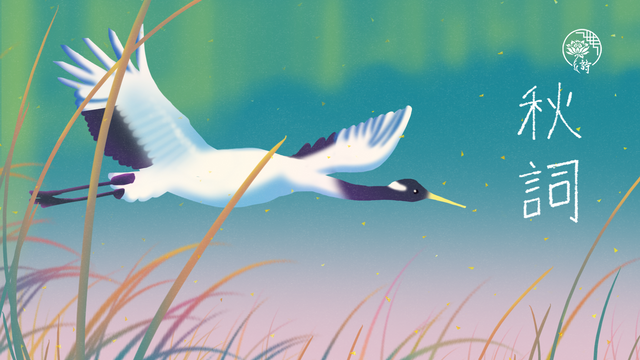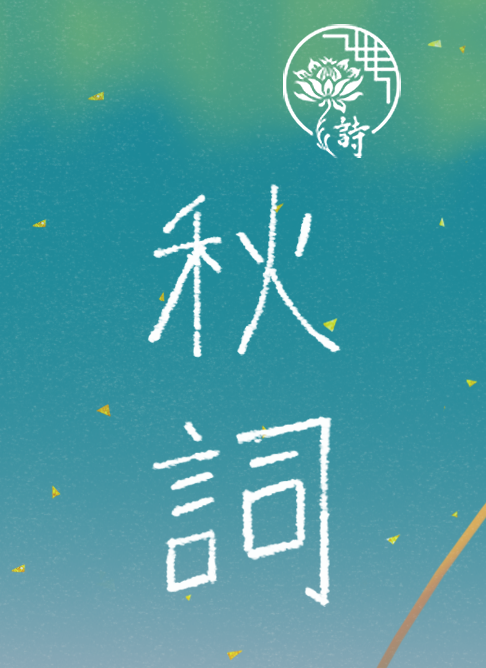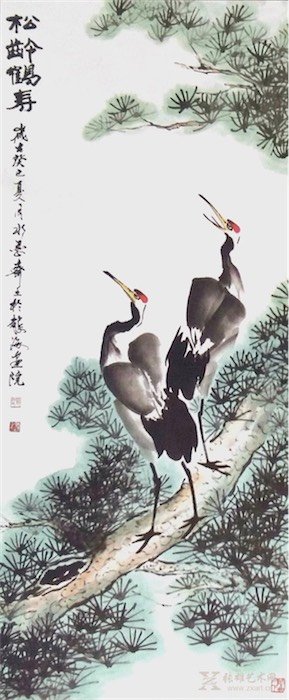Chinese poem - “Autumn Words" By Liu Yuxi (Includes original song and video) | 《秋詞(其一)》- 劉禹錫 (內有原創樂曲及影片)
Last time we introduced Hiking by Du Mu who articulated his love for autumn through the livelihood in the maple forest. This time we will introduce Autumn Words by Liu Yuxi. Like Du, Liu’s autumn is full of optimism and energy.
上次我們向大家介紹了杜牧的《山行》,作者一反傳統,描寫了充滿生機的楓林,表達了他對深秋的喜愛。這次,我們要向大家介紹的是劉禹錫《秋詞》二首之其一。這首詩與杜牧的《山行》有一個相似之處:兩位作者都沒有「悲秋」,反而借詩表達了正面、積極的情感。
The background 創作背景

In AD805, Liu took part in a political reform where the purpose was to instill integrity into the ruling organization. By AD806 the political reform had to be abandoned due to resistance from many of those in power. Liu was demoted and sent to Langzhou which is Wuhan in modern day China. He wrote this poem during his time there. Although Liu was demoted, you can’t sense any cynicism or anger in his poem. Instead, the poem is very motivating and inspiring.
公元805年,劉禹錫參與了王叔文主導的政治改革,希望通過廉潔正直的政策為朝政帶來新局面。但公元806年,此次改革因受到宦官等勢力反對而不幸失敗。其後,劉禹錫被貶為朗州司馬,這首詩就是他此時所作。作者雖然被貶,但並沒有在詩中表露憤世嫉俗、懷才不遇之恨;反而展現出了積極向上的抱負與排除萬難而取得成功的決心,讓人為之振奮。
The meaning of the poem作品大意

自古逢秋悲寂寥,我言秋日勝春朝。
Zì gǔ féng qiū bēi jì liáo , wǒ yán qiū rì shèng chūn zhāo 。
晴空一鶴排雲上,便引詩情到碧霄。
Qíng kōng yī hè pái yún shàng , biàn yǐn shī qíng dào bì xiāo 。
Traditionally everyone says autumn is cold and sad, but I say autumn is better than spring
自古代以來每逢秋季(文人墨客)都悲嘆它的沉寂與冷清,我就說秋天更勝初春。
There’s a crane in the clear sky and it’s flying through the clouds, it has inspired me to write poems and reach for the blue sky
晴朗的天空中一隻鶴衝破雲霄飛上天空,也就激發我作詩的興致飛向青天。
Highlights 精選詩句

Qíng kōng yī hè pái yún shàng , biàn yǐn shī qíng dào bì xiāo
晴空一鶴排雲上,便引詩情到碧霄
The poet uses the nature scene of the crane flying through the clear sky, and the blue sky to reflect his desire the work against all odds and start afresh. Although he has been demoted, he isn’t upset or demotivated and uses the analogy of the crane to articulate his feelings. However, cranes usually fly in flocks, and in his poem there is only a lone crane. Maybe the poet is using a lone crane to represent his loneliness to fight a lonely battle for his future.
表面上兩句詩借景抒情,借凌雲直上的鶴、「晴空」與「碧霄」這些壯闊非凡的景象展現出作者豪邁澎湃的詩情;更深一層,兩句詩托物言志,借衝破雲層的鶴表達了他排除萬難而開闢新天地的雄心壯志。劉禹錫被貶朗州,心情必然不甚愉快。可是他並沒有意志消沉,反而以自由、無畏的「鶴」自比,表達了雖然身處困境但始終懷有壯志的情感。然而,這隻鶴是孤獨的。鶴是典型的群聚動物,作者只是看到了「一鶴」嗎?非也。或許,作者是在借這「一鶴」表達自己遺世獨立的高尚情操。政改標誌著進步,但始終敵不過小人的反對。世間能理解他、又在他身邊的人,又能有幾個呢?縱然如此,劉禹錫仍是不言放棄,以不屈不撓的精神面對將來的挑戰。讀者雖然能從這兩句讀出淡淡的憂傷,但更多的是作者豁達豪放的情感,實在耐人尋味。
Fun fact 趣味小知識

Photo reference
The crane is an integral part of this poem. Do you know what the crane represents in ancient Chinese literature? It has been mentioned in many well known poems and has quite a few faces. For example, the poet Cui Wei describes it as elegant. Many other poets describes it as being immortal, thus representing longevity. And finally, a well known figure called Lù jī was killed when he was involved in a political battle. In his dying words he mentioned the crane, thus the crane has been associated with regrets.
「鶴」的象徵:在這首詩中,「鶴」佔了很重要的位置。大家又知不知道,「鶴」在古代有著什麼象徵意義呢?牠的其中一個象徵就是清雅高潔。例如唐代詩人崔顥在《黃鶴樓》中寫到:「昔人已乘黃鶴去,此地空餘黃鶴樓」;《相鶴經》中提到鶴是「羽族之宗長,仙人之騏驥」。由此可見,修長俊逸的鶴經常與神仙相提並論。牠的另外一個象徵是長壽。相信大家都聽過「龜鶴延年」、「鶴壽松齡」等成語,它們反映了鶴代表「長壽」的傳統。另外,鶴還象徵著君子。舉例來說,古代稱品行高尚的人為「鶴鳴之士」。不過說到「鶴鳴」,就不得不提起「鶴」的另一個象徵:思鄉、遺憾與悲涼。來自華亭的西晉名士陸機因捲入政治鬥爭被殺,臨死前歎到:「欲聞華亭鶴唳,可復得乎?」從此,「華亭鶴唳」便成為了遺恨難收、千古不泯的代名詞。

Posted from my blog with SteemPress :http://ccp-hk.vornix.blog/2018/11/16/ccp20/
制作挺精良的,声音也很是空灵动人。不过那段机器的读诗是不是去掉,感觉格格不入的呢。
謝謝...有興趣來真人讀讀嗎? 正在想籌備朗誦大賽, 會有人參加嗎?
应该有人,不过应该不多吧
那就好了~
因為混音做得不好,所以有點怪怪的,會加以改良,謝謝提出意見~
Congratulations @ccp-hk! You received a personal award!
Click here to view your Board of Honor
Congratulations @ccp-hk! You received a personal award!
You can view your badges on your Steem Board and compare to others on the Steem Ranking
Do not miss the last post from @steemitboard:
Vote for @Steemitboard as a witness to get one more award and increased upvotes!